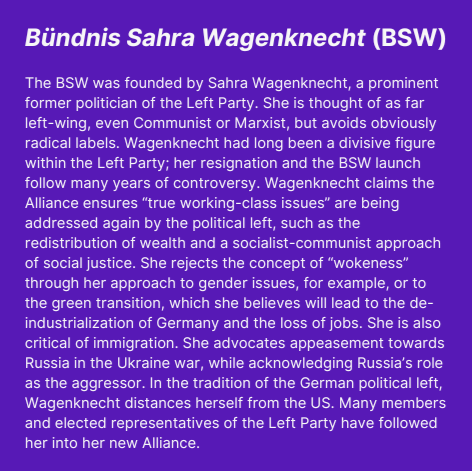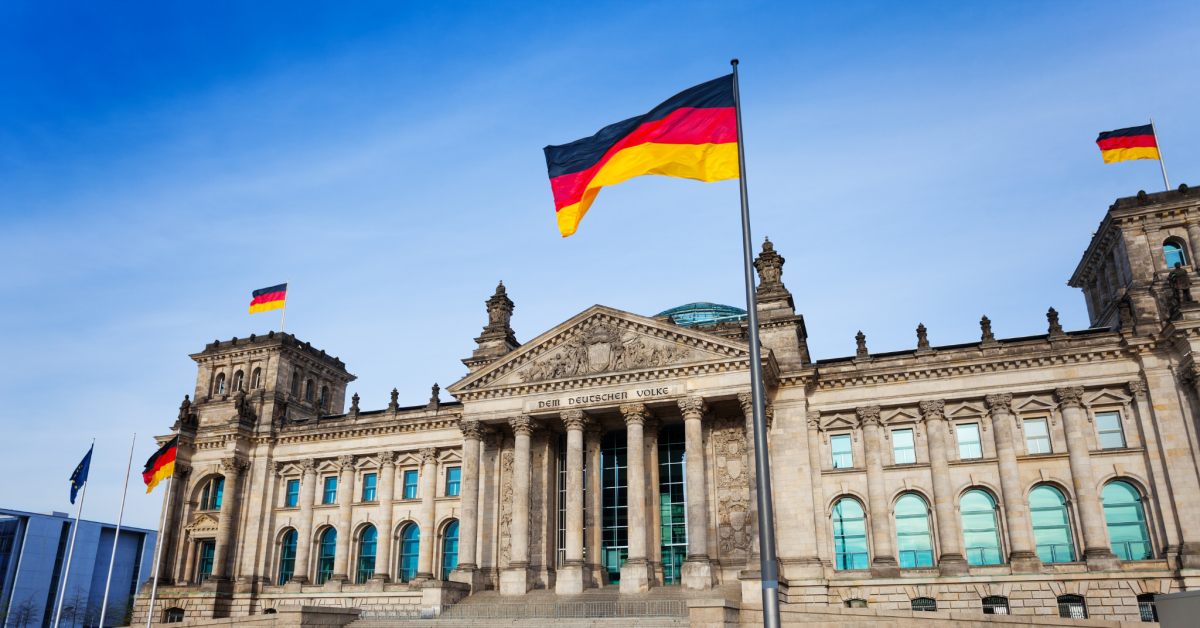Three Key Issues Loom Over Germany’s State Elections
Overview
The traditional political summer break in Germany will end with a big bump—on September 1, the Länder (federal states) of Saxony and Thuringia will elect new state parliaments which will lead to new state governments, and Brandenburg will follow on September 22. The results will reverberate across the German political landscape, including at the national level.
Polls predict that the far-right populist Alternative for Germany (AfD) could come first in all three states, while the parties of the political center, including the three members of the governing coalition at federal level—the social-democratic SPD, the Greens, and the liberal FDP—are largely set for defeat. There is also a new challenger party which might be catapulted straight into regional government: the left-wing populist Sahra Wagenknecht Alliance (BSW).
The elections are likely to exacerbate the continuing crisis within Chancellor Scholz’s Traffic Light coalition (red SPD, amber FDP, and Greens) in Berlin. In each of the three states it will be tough to form governing majorities without the far-right AfD, which is treated as a pariah by the centrist parties. If they want to govern in coalition in these eastern states, all parties in the democratic center will be forced to make further concessions on their own policy positions and unique selling points (USPs) in the eyes of voters. The fragmentation of power will also make it harder to find compromises on policy and legislation in the Bundesrat—the federal body that ensures Germany’s states counterbalance the federal parliament, the Bundestag.
The campaign for the September 2025 Bundestag elections will increasingly pre-occupy German politics and politicians from now on, and there will be less focus on the business of governing. Businesses and public affairs professionals should be prepared for a messy end to the Traffic Light coalition and, in addition, start to consider their stance towards the rising force of the left-wing populists of the BSW.
The east wind in Germany traditionally heralds cold weather in the spring. But this fall, the regional elections in the east of the country are set to send a chill through the federal government in Berlin. Three key issues loom large over the state elections in Saxony and Thuringia on September 1 and in Brandenburg on September 22: the rise of far-right populism, the entrance of Sahra Wagenknecht Alliance, and Scholz’s struggling coalition.
Issue One: A far-right populist jolt

As in several countries worldwide, right-wing populism has been on the rise in Germany for several years. The AfD, which was founded roughly a decade ago as a Euroskeptic/liberal party and has since evolved into a right-wing populist stronghold, has firmly established itself in the German political party structure, and is particularly strong in the so-called Neue Bundesländer (the five states of the former German Democratic Republic: Mecklenburg-Western Pomerania, Brandenburg, Saxony, Saxony-Anhalt, and Thuringia). Polls are predicting that the party could grab the most votes not only in the forthcoming elections in Saxony, Thuringia, and Brandenburg, but also in Mecklenburg-Western Pomerania and Saxony-Anhalt when they vote in 2026.
Issue Two: Enter the Sahra Wagenknecht Alliance
As well as the AfD, the established parties of the democratic center have recently been challenged by another pretender: the Bündnis Sahra Wagenknecht (BSW; the Sahra Wagenknecht Alliance).

Since 2017, a total of seven parties have held seats in the Bundestag and been seen as the main political party players in Germany: the center-right CDU and CSU (the CDU’s Bavarian sister party), which form a joint group in parliament, the center-left SPD, the liberal FDP, the Greens, the left-wing Left Party, and the AfD. These parties have dominated the political landscape in Germany, with minor parties of limited significance in particular regions.
The BSW, founded only seven months ago, has changed all that. It has rapidly gained voter popularity and, after a successful campaign for the European Parliament elections in June (6.2% of German votes, 6 MEPs), is also aiming to enter state parliaments and, next year, the Bundestag.
With a blend of populist positions from right and left (see box), the BSW has the potential to challenge the AfD’s role as the protest voter’s natural choice, with one crucial distinction that plays in the BSW’s favor: The BSW does not stand accused of being a “Nazi” party by its opponents, like the AfD. The BSW could pick up protest votes from all those who feel alienated from the incumbent political parties and/or reject the “woke” Zeitgeist, but at the same time want to avoid being accused of voting for a radical right-wing Nazi party. Polls put the BSW at 15% in Saxony, 20% in Thuringia, and 17% Brandenburg shortly before the elections.
Not untouchable
Crucially, unlike the AfD, which has been a political pariah for other parties throughout its existence, the BSW is only isolated in the political debate at the federal level. At the state level, Brandenburg’s SPD Prime Minister Dietmar Woidke, Saxony’s CDU Prime Minister Michael Kretschmer, and Thuringia’s CDU lead candidate Mario Voigt have all signaled that a coalition with the BSW could be possible. CDU national leader Friedrich Merz even pointed out that while cooperation with the BSW was not conceivable in a federal coalition, circumstances might make it necessary at the regional level.
A bidding war at the expense of political stability and substance
These statements and positions reflect forward-looking pragmatism on the part of the traditional parties. With the AfD expected to be so strong, and maybe even the largest party in each of the elections, it will be difficult for the traditional parties to form governing coalitions backed by a parliamentary majority in each of the states. With this in mind, they are trying to keep open as many power options as possible.
Sahra Wagenknecht has already ruled out any coalition with the Greens and also deliberately emphasizes that, as a new party advocating for true change, the only way forward is a role in opposition. But she also understands the power-brokering realities and is upping the ante. Other parties will likely have to pay a high policy price for the BSW to join them in coalition in the states, potentially beyond local policy issues. For example, the BSW continues to put pressure on other parties over federal and foreign policy issues, like the war in Ukraine. And yet, talks between the CDU and BSW are already taking place behind the scenes.
If elections outcomes in the eastern states result in a state government coalition involving the BSW, the common ground of this coalition will be rather thin and narrow. Voters will likely find any such coalition rather unstable and difficult to meaningfully govern. Participating in one could well harm the prospects of a party at the federal level ahead of the September 2025 general election.
Issue Three: Crisis mode continues for Scholz’s Traffic Light coalition
The three eastern elections in September, combined with the current political outlook in the three states and at the federal level, add insult to injury for Chancellor Olaf Scholz’s Traffic Light coalition.

- Crisis mode continues: The elections threaten to be not only totemic victories for the AfD but also clear defeats for the SPD, the Greens, and the FDP. Their alliance in the federal government coalition has failed to create the impression of stable government cooperation throughout the entire legislative period since 2021. This will presumably be the parties’ last year in government together before the 2025 general election, and it picks up where it left off before the summer break—in crisis mode.
- Governing Germany will become even more difficult: Multi-party government coalitions in the eastern states with possibly completely new players will cause the Bundesrat (often described as the second house of the federal legislature) to become even more fragmented. The Chancellor’s SPD and the Greens are set to lose seats in the Bundesrat committees and therefore influence (see Annex). Legislating at the federal level will become even more of a delicate balancing act in which consensus has to be reached between increasingly divergent views.
Now what?
Are the Nazis coming back to power?
No. Germany’s history means right-wing populism is an acutely sensitive issue both domestically and for outside observers. While it would be a major error to understate the seriousness of these developments, the AfD’s success is in line with the broader global trend of rising support for right-wing populists. Germany’s electoral systems almost inevitably require power-sharing coalition governments at the state and federal level. For all parties of the democratic political center, the AfD was and remains a political pariah around which they build a “firewall” of non-cooperation. The AfD may become a strong opposition but it will not be granted any decision-making power.
It remains to be seen how many voters will actually stick with the AfD in next year’s federal elections, now that the BSW offers an “alternative to the Alternative” which targets “unsatisfied protest voters” but with less, or different, historical baggage.
Companies and public affairs professionals should start to consider their stance towards BSW…
So far, the AfD has been the main member of the “Awkward Squad” in German politics. The answer to the question of how—or rather whether—to deal with them was very clear: hands off. Cooperating with a right-wing populist party with leading members who are officially termed “fascist” and internal groupings officially labeling as “extremist” by German courts has been seen as unthinkable.
The BSW presents a trickier dilemma. Its favorable stance towards Russia is questionable for many, but they find it harder to describe the BSW in stronger terms, at least for now, as it continues to emphasize pacifism as its guiding principle. The socialist-communist tendencies within the BSW also exist within the Left Party and even within elements of the SPD, and the Left Party currently leads the governing coalition in Thuringia as well as being a junior coalition partner in Bremen and Mecklenburg-Western Pomerania. There is not yet a clear reason for the BSW to be untouchable.
The true core of the BSW’s convictions and therefore its commitment to democracy remains to be unearthed because the BSW has not yet developed a party manifesto. But the fact that both CDU and SPD are willing to cooperate with the BSW at the state level is a signal of its growing relevance to public affairs. Companies should already be working through this.
…and will face an even more struggling government.
The year before federal elections, government and opposition parties are struggling to stand out from one another. We expect many politicians to be preoccupied with their own prospects and those of their party, rather than focused on lawmaking and delivering on policy agendas.
Chancellor Olaf Scholz estimates that his SPD-Greens-FDP coalition has implemented “a good 80%” of the policy projects set out in the coalition treaty in 2021. Legislation is still due over the remaining 12 months, especially in the health sector, including the Pharmacy Reform Act which aims to secure the presence of a sufficient number of pharmacies in rural areas (but meets heavy opposition from the pharmacies themselves) and the Cardio Act, due imminently, to improve cardiovascular health in Germany. The Hospital Care Improvement Act has at least already made it to the Bundestag, but this still needs the approval of the Bundesrat. The Children’s Food Advertising Act, with restrictions for foods high in fat, salt, or sugar is a Green project which has been repeatedly postponed. It may well fall victim to internal coalition rows and be vetoed by the FDP. A bill that would favor companies with collective bargaining agreements in public procurement has not even been drafted yet, but would be highly contentious within the coalition, especially between the FDP and the SPD.
After all the governing coalition has been through, it would need a major development to actually cause the Traffic Light coalition to collapse before next year’s election, but all signs point towards a rather messy stumble towards the exit rather than a grand finale.
Will the CDU have the last laugh?
In the short term, it looks like the CDU will get off lightly in the three eastern state elections and may even grab back power in Thuringia. In the long term, the prospects of the CDU re-taking the Federal Chancellery next September currently appear fairly good, potentially on the basis of a coalition with the SPD and/or the Greens. However, the price of any openness to a CDU coalition with the BSW also remains to be seen. There is a contradiction visible for all to see in the CDU ruling out cooperation with the Left Party for years (as the successor of the socialist former-GDR ruling party SED) but now contemplating cozying up to the BSW, which could be seen as a Left Party “re-tread.” After the Angela Merkel era, the CDU has just concluded a long-running process to sharpen its profile and cooperation with the BSW might quickly start to erode this again.
Annex: Current seat allocation in the Bundesrat and possible implications of the elections
Current seat allocation in the Bundesrat plenary and committees

- In Brandenburg, SPD (red) Prime Minister Dietmar Woidke is likely to compete with CDU (black) for second place behind AfD, with BSW coming in as a close third. A continuation of the current SPD/CDU/Greens coalition is possible. However, for a more stable majority, or because results do not match what the polls promised, SPD and CDU could team up with BSW, kicking the Greens out of the government.
- In Saxony, CDU Prime Minister Michael Kretschmer is head-to-head with the AfD in the polls. A coalition with BSW might already yield a stable majority, meaning that both SPD and Greens will lose their seats at the cabinet’s table.
- In Thuringia, Left Party (purple) Prime Minister Bodo Ramelow is likely to fall back to fourth place, behind AfD, CDU, and BSW. The continuation of his coalition with SPD and the Greens seems impossible according to the polls. A CDU/BSW coalition could already yield a majority, depending on the Greens who are struggling to even meet the threshold to enter parliament again, leaving both them and the SPD out of government.
With political change set to affect Germany and the EU this year, global companies benefit from specialist EU public affairs and government relations advice. EGA has the experience and skills in Berlin and Brussels to help you navigate Germany and the EU institutions within their wider context. Our subject experts offer deep knowledge of policies in their specialist areas along with politics and global awareness. We connect your business priorities to the policies and politics of Germany and the European Union.
For further information, please contact EGA’s Berlin team at Fiete.Starck@edelmanEGA.com, or our EU team at Rocco.Renaldi@edelmanEGA.com or David.Bates@edelmanEGA.com



